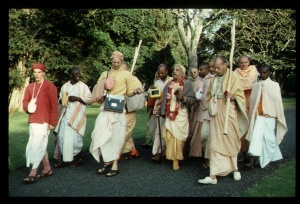CC Antya 3.54: Difference between revisions
m (1 revision(s)) |
(Vanibot #0054 edit - transform synonyms into clickable links, which search similar occurrences) |
||
| (One intermediate revision by one other user not shown) | |||
| Line 1: | Line 1: | ||
{{ | [[Category:Sri Caitanya-caritamrta - Antya-lila Chapter 03|C054]] | ||
<div style="float:left">'''[[Sri Caitanya-caritamrta|Śrī Caitanya-caritāmṛta]] - [[CC Antya|Antya-līlā]] - [[CC Antya 3|Chapter 3: The Glories of Śrīla Haridāsa Ṭhākura]]'''</div> | |||
<div style="float:right">[[File:Go-previous.png|link=CC Antya 3.53|Antya-līlā 3.53]] '''[[CC Antya 3.53|Antya-līlā 3.53]] - [[CC Antya 3.55|Antya-līlā 3.55]]''' [[File:Go-next.png|link=CC Antya 3.55|Antya-līlā 3.55]]</div> | |||
{{CompareVersions|CC|Antya 3.54|CC 1975|CC 1996}} | |||
{{RandomImage}} | |||
==== TEXT 54 ==== | ==== TEXT 54 ==== | ||
<div class="verse"> | |||
<div | :mahā-preme bhakta kahe,—‘hā rāma, hā rāma’ | ||
mahā-preme bhakta kahe,—‘hā rāma, hā rāma’ | :yavanera bhāgya dekha, laya sei nāma | ||
yavanera bhāgya dekha, laya sei nāma | |||
</div> | </div> | ||
| Line 13: | Line 16: | ||
==== SYNONYMS ==== | ==== SYNONYMS ==== | ||
<div class="synonyms"> | |||
<div | ''[//vanipedia.org/wiki/Special:VaniSearch?s=mahā&tab=syno_o&ds=1 mahā]-[//vanipedia.org/wiki/Special:VaniSearch?s=preme&tab=syno_o&ds=1 preme]'' — in great ecstatic love; ''[//vanipedia.org/wiki/Special:VaniSearch?s=bhakta&tab=syno_o&ds=1 bhakta] [//vanipedia.org/wiki/Special:VaniSearch?s=kahe&tab=syno_o&ds=1 kahe]'' — a devotee says; ''[//vanipedia.org/wiki/Special:VaniSearch?s=hā&tab=syno_o&ds=1 hā] [//vanipedia.org/wiki/Special:VaniSearch?s=rāma&tab=syno_o&ds=1 rāma] [//vanipedia.org/wiki/Special:VaniSearch?s=hā&tab=syno_o&ds=1 hā] [//vanipedia.org/wiki/Special:VaniSearch?s=rāma&tab=syno_o&ds=1 rāma]'' — “O Lord Rāmacandra, O Lord Rāmacandra”; ''[//vanipedia.org/wiki/Special:VaniSearch?s=yavanera&tab=syno_o&ds=1 yavanera]'' — of the ''yavanas''; ''[//vanipedia.org/wiki/Special:VaniSearch?s=bhāgya&tab=syno_o&ds=1 bhāgya]'' — fortune; ''[//vanipedia.org/wiki/Special:VaniSearch?s=dekha&tab=syno_o&ds=1 dekha]'' — just see; ''[//vanipedia.org/wiki/Special:VaniSearch?s=laya&tab=syno_o&ds=1 laya] [//vanipedia.org/wiki/Special:VaniSearch?s=sei&tab=syno_o&ds=1 sei] [//vanipedia.org/wiki/Special:VaniSearch?s=nāma&tab=syno_o&ds=1 nāma]'' — they are also chanting the same holy name. | ||
mahā- | |||
</div> | </div> | ||
| Line 21: | Line 23: | ||
==== TRANSLATION ==== | ==== TRANSLATION ==== | ||
<div class="translation"> | |||
<div | |||
“A devotee in advanced ecstatic love exclaims, ‘O my Lord Rāmacandra! O my Lord Rāmacandra!’ But the yavanas also chant, ‘hā rāma, hā rāma!’ Just see their good fortune!” | “A devotee in advanced ecstatic love exclaims, ‘O my Lord Rāmacandra! O my Lord Rāmacandra!’ But the yavanas also chant, ‘hā rāma, hā rāma!’ Just see their good fortune!” | ||
</div> | </div> | ||
| Line 28: | Line 29: | ||
==== PURPORT ==== | ==== PURPORT ==== | ||
<div class="purport"> | |||
If a child touches fire, the fire will burn him, and if an elderly man touches fire, it will burn him also. Haridāsa Ṭhākura says that a great devotee of the Lord exclaims ''hā rāma, hā rāma,'' but although ''yavanas'' do not know the transcendental meaning of ''hā rāma, hā rāma,'' they say those words in the course of their ordinary life. For the ''yavanas'' the words ''hā rāma'' mean “abominable,” whereas the devotee exclaims the words ''hā rāma'' in ecstatic love. Nevertheless, because the words ''hā rāma'' are the spiritual ''summum bonum'', the fact is the same, whether they are uttered by ''yavanas'' or by great devotees, just as fire is the same both for a child and for an elderly man. In other words, the holy name of the Lord, ''hā rāma'', always acts, even when the holy name is chanted without reference to the Supreme Lord. ''Yavanas'' utter the holy name in a different attitude than devotees, but the holy name ''hā rāma'' is so powerful spiritually that it acts anywhere, whether one knows it or not. This is explained as follows. | |||
</div> | |||
<div | <div style="float:right; clear:both;">[[File:Go-previous.png|link=CC Antya 3.53|Antya-līlā 3.53]] '''[[CC Antya 3.53|Antya-līlā 3.53]] - [[CC Antya 3.55|Antya-līlā 3.55]]''' [[File:Go-next.png|link=CC Antya 3.55|Antya-līlā 3.55]]</div> | ||
__NOTOC__ | |||
</div> | __NOEDITSECTION__ | ||
__NOTOC__ | |||
Latest revision as of 20:28, 19 February 2024

A.C. Bhaktivedanta Swami Prabhupada
TEXT 54
- mahā-preme bhakta kahe,—‘hā rāma, hā rāma’
- yavanera bhāgya dekha, laya sei nāma
SYNONYMS
mahā-preme — in great ecstatic love; bhakta kahe — a devotee says; hā rāma hā rāma — “O Lord Rāmacandra, O Lord Rāmacandra”; yavanera — of the yavanas; bhāgya — fortune; dekha — just see; laya sei nāma — they are also chanting the same holy name.
TRANSLATION
“A devotee in advanced ecstatic love exclaims, ‘O my Lord Rāmacandra! O my Lord Rāmacandra!’ But the yavanas also chant, ‘hā rāma, hā rāma!’ Just see their good fortune!”
PURPORT
If a child touches fire, the fire will burn him, and if an elderly man touches fire, it will burn him also. Haridāsa Ṭhākura says that a great devotee of the Lord exclaims hā rāma, hā rāma, but although yavanas do not know the transcendental meaning of hā rāma, hā rāma, they say those words in the course of their ordinary life. For the yavanas the words hā rāma mean “abominable,” whereas the devotee exclaims the words hā rāma in ecstatic love. Nevertheless, because the words hā rāma are the spiritual summum bonum, the fact is the same, whether they are uttered by yavanas or by great devotees, just as fire is the same both for a child and for an elderly man. In other words, the holy name of the Lord, hā rāma, always acts, even when the holy name is chanted without reference to the Supreme Lord. Yavanas utter the holy name in a different attitude than devotees, but the holy name hā rāma is so powerful spiritually that it acts anywhere, whether one knows it or not. This is explained as follows.